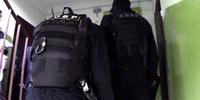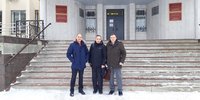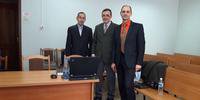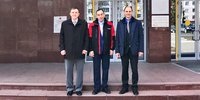The case of Dutkin and Others in Cheboksary
Filter
- #
A criminal case was initiated against Vladimir Dutkin and unidentified persons under Part 1 of Article 282.2 of the Criminal Code of the Russian Federation (organization of activities of a banned organization).
- #
Searches are being conducted in the homes of 7 civilians in Cheboksary and Novocheboksarsk, including Vladimir Dutkin. Six believers were taken away for interrogation.
- #
Vladimir Dutkin is charged under Part 1 of Article 282.2 of the Criminal Code of the Russian Federation. He is chosen a measure of restraint in the form of a written undertaking not to leave and proper behavior.
- #
The judge of the Leninsky District Court of Cheboksary, E. Pavlova, orders the arrest of Vladimir Dutkin's car. The resolution notes that this was done "in order to ensure the execution of the sentence in terms of collecting a fine in a criminal case."
- #
Lieutenant Colonel of Justice A. Mukhin, Senior Investigator for Internal Affairs of the Federal Security Service of Russia in the Chuvash Republic, is prosecuting two more residents of Chuvashia, 53-year-old Valery Yakovlev and 62-year-old Vladimir Chesnokov, as defendants under Part 1 of Article 282.2 of the Criminal Code.
- #
Senior investigator A. Mukhin re-indicts Vladimir Dutkin under Part 1 of Article 282.2 of the Criminal Code of the Russian Federation. The ruling states that the believer, "aware of the unlawfulness of his actions ... organized and conducted meetings (meetings) of the religious group of Jehovah's Witnesses in Cheboksary in specially rented premises, fenced with a solid high fence with a separate entrance, excluding any visual and voice contacts with unauthorized persons, under the guise of friendly meetings, tea parties, barbecue cooking.
- #
The criminal case against Vladimir Dutkin, Valery Yakovlev and Vladimir Chesnokov is submitted to the Kalininsky District Court of the city of Cheboksary. It will be considered by judge Sergei Orlov.
- #
The court begins hearings on the merits. About 40 of their friends and relatives come to support the believers. Only 10 people are allowed to attend the meeting.
The judge rejects the defense's request to return the case to the prosecutor's office. The prosecutor reads out the indictment, the lawyer reads out the attitude to the charges.
- #
The court examines the materials of the second volume of the criminal case. The lawyer draws the court's attention to the fact that in the materials under consideration, describing the foundations of the beliefs of Jehovah's Witnesses, there are no calls for the severance of family and kinship relations.
- #
The court shall consider the materials of volumes 3 to 6 of the case. Believers draw the court's attention to biblical principles appearing in the materials: the "golden rule" from the Gospel of Matthew; danger of anger; The harm of flirting. A video recording of believers praying and singing songs is played in court. Vladimir Chesnokov emphasizes that the lyrics of one of the songs contain a call to do good to other people.
Among the materials studied is a telephone conversation between Dutkin and his acquaintance, in which they discuss blood transfusions. Counsel draws the court's attention to the fact that there was no coercion on the part of the accused to refuse this procedure.
- #
Interrogation of an FSB officer. When asked whether Dutkin behaved aggressively during the search, the witness answers in the negative and admits that he was pleasantly surprised that the believer behaved with dignity. The law enforcement officer adds: "Your organization is still banned, but soon, perhaps, it will be resolved thanks to God's help, thanks to Jehovah."
An employee of the Center for Combating Extremism (CPE) is being interrogated. Counsel asks him to explain on what grounds he determined that the defendants continued the activities of the Administrative Center of Jehovah's Witnesses in Russia. The only signs a witness can give are a mention of The Watchtower magazine and the singing of songs. Nor can he cite the facts of the rupture of family relations among believers.
- #
About 40 people come to support the believers, but no one is allowed into the courthouse.
Interrogation of the head physician of the Cheboksary blood transfusion station L. M. Yakovleva. According to the expert, blood transfusion carries more dangers than the use of blood substitutes; refusing blood transfusions is not a violation of the law; she was not aware of Dutkin and Chesnokov forcing anyone to refuse a blood transfusion.
A man, a former Jehovah's Witness, is being interrogated. He explains that the life position of Jehovah's Witnesses in various fields is based on the Bible. He admits that no one forced him to become Jehovah's Witness or refuse blood transfusions. According to the man, neither Dutkin, nor Chesnokov, nor Yakovlev called for a divorce. He explains that the Bible in the New World Translation differs from other translations only in that it restores the name of God in the places where it appears in the original.
- #
About 30 people come to the courtroom to support the believers, but none of them are allowed through.
A witness for the prosecution, a woman who has attended Jehovah's Witnesses services in the past, is being questioned. According to her, anyone who was prepared could speak at such meetings; There were no forced monetary collections, donations were made voluntarily.
- #
A secret witness "Ivanov" is being questioned in court. All of his testimonies relate to events that took place before 2011, while the believers are charged with religious activities carried out after April 2017.
- #
The lawyer reads out the conclusion of the religious examination. He focuses on two of its conclusions: from the point of view of Jehovah's Witnesses, it is important to show respect for relatives who do not share their religious views; You can divorce only because of adultery.
- #
The defense declares to the court that the psycholinguistic examination present in the case file is not objective, since it was carried out by an FSB officer (Komleva). In addition, Komleva spent only one day on the entire examination. In addition, this specialist cannot give a religious assessment of the activities of believers, since he does not have a special education.
The religious examination conducted by the religious scholar Vovchenko is read out. The lawyer draws the court's attention to the fact that there are obvious contradictions in it.
- #
The 5th volume of the criminal case is being studied. The lawyer draws attention to the fact that the synopsis of the biblical speech contained in it a call to avoid pride and nationalism, which divide people.
- #
At the hearing, recordings of telephone conversations of the defendants are played. Among other things, the court listens as believers gather to visit and discuss plans for a trip to barbecue.
- #
The court begins watching videos of joint meetings of believers, which since 2017 have been held in the rented premises of the Lotus health center. These meetings were secretly recorded by the CPE staff.
- #
The viewing of videos made in the health center "Lotus" in 2018 continues. The recordings show believers discussing the importance of singing and singing together; After that, the audience drinks tea and chats.
- #
The court continues to review the hidden video footage from 2018. The lawyer draws the court's attention to the fact that there were no calls for violence at the services. He also reads excerpts from the decision of the Plenum of the Supreme Court of the Russian Federation of October 28, 2021, which explains that the divine services of Jehovah's Witnesses, their joint rituals and ceremonies do not in themselves constitute a crime under Article 282.2 of the Criminal Code of the Russian Federation, despite the liquidation of their legal entities.
- #
To support the believers, about 30 people come to court (such a number of relatives and friends of the accused come to each session). They are still not allowed into the courtroom, but they do not disperse and, while the hearing is ongoing, help clean the snow in front of the courthouse.
- #
The defense submits a motion for admission to court hearings of listeners vaccinated against COVID-19 or who have had it, or for the organization of broadcasting of hearings via videoconferencing. The judge refuses to satisfy the petition, referring to the seriousness of the article in the criminal case.
- #
About 25 people come to the courthouse to support the believers.
Dutkin's lawyer requests the questioning of some experts, whose conclusion states that the actions of the defendants led to the breakdown of family and family relations. However, not a single fact proving this claim is even mentioned in the documents. The lawyer insists that the experts give grounds for such conclusions. The judge rejects the petition.
In court, the written notes are read out by the defendant Yakovlev. He draws attention to the public benefit of the activities of Jehovah's Witnesses, who try to maintain order and urge not to obstruct the authorities.
The prosecutor asks the court to give the prosecution time to prepare a statement in the debate.
- #
The court shall proceed to the pleadings of the parties. 50 people come to the courthouse to support the believers, but no one is allowed to attend the hearing.
The prosecutor asks for punishment: Vladimir Chesnokov and Valery Yakovlev are 6 years each, and Vladimir Dutkin is 6.5 years in a general regime colony.
The defense emphasizes that believers are persecuted only because they gathered to discuss the Bible. The lawyer asks the court to appoint an independent psycholinguistic and religious examination to determine whether the believers called for the breakdown of family relations. The court refuses.
- #
The last word of the defendant Vladimir Chesnokov in Cheboksary Valery Yakovlev's last word in Cheboksary The last word of the defendant Vladimir Dutkin in Cheboksary - #
Judge of the Kalininsky District Court of the city of Cheboksary, Sergey Orlov, finds three believers guilty of organizing extremist activities. Vladimir Dutkin was fined 500,000 rubles, Chesnokov and Yakovlev were fined 400,000 rubles.
- #
The panel of judges of the Supreme Court of the Chuvash Republic approves the fine to Vladimir Dutkin, Vladimir Chesnokov and Valery Yakovlev.
- #
- #



